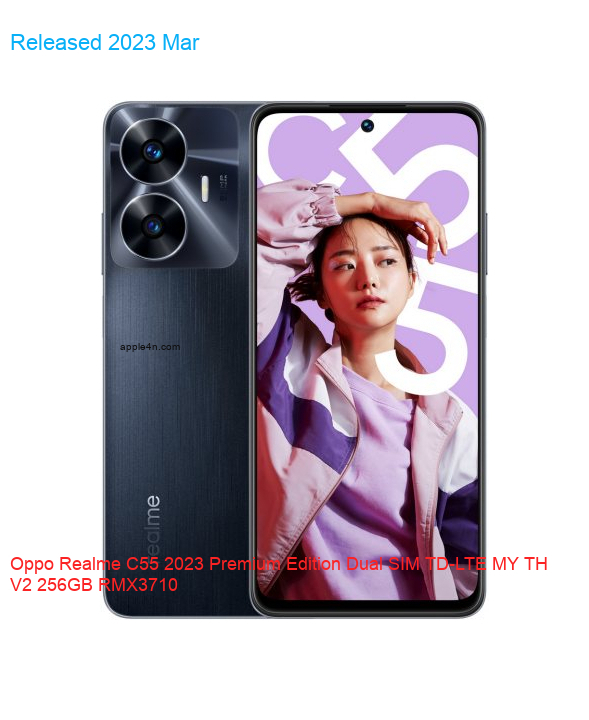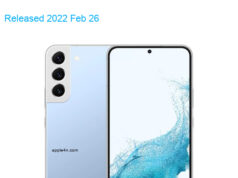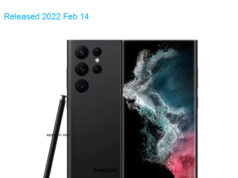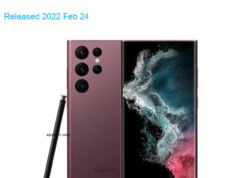| Brand | Oppo |
| Model | Realme C55 2023 Premium Edition Dual SIM TD-LTE MY TH V2 256GB RMX3710 |
| Released | 2023 Mar |
| Announced | 2023 Mar 7 |
| Hardware Designer | Oppo |
| Manufacturer | BBK Electronics |
| Codename | BBK R3710 |
| General Extras | Haptic touch feedback |
| Device Category | Smartphone |
| Width | 75.9 mm |
| Height | 165.6 mm |
| Depth | 7.89 mm |
| Dimensions | 2.99×6.52×0.31 inches |
| Mass | 189.5 g |
| Platform | Android |
| Operating System | Google Android 13 (Tiramisu) |
| Software Extras | Voice Command , Navigation software , Augmented Reality (AR) , Intelligent personal assistant , Face Recognition |
| CPU Clock | 2000 MHz |
| CPU | MediaTek Helio G88 MT6769H, 2021, 64 bit, octa-core, 12 nm, ARM Mali-G52 2EEMC2 GPU |
| RAM Type | LPDDR4x SDRAM |
| RAM Capacity (converted) | 8 GiB RAM |
| Non-volatile Memory Interface | eMMC 5.1 |
| Non-volatile Memory Capacity (converted) | 256 GB ROM |
| Display Hole | 1-hole |
| Display Diagonal | 170.7 mm |
| Resolution | 1080×2400 |
| Horizontal Full Bezel Width | 5.85 mm |
| Display Area Utilization | 86.8% |
| Pixel Density | 392 PPI |
| Display Type | Color IPS TFT LCD display |
| Number of Display Scales | 16.8M |
| Display Refresh Rate | 90 Hz |
| Scratch Resistant Screen | Yes |
| Graphical Controller | ARM Mali-G52MP2 |
| GPU Clock: | 1000 MHz |
| A/V Out | No |
| Audio Controller | MediaTek MT6358 |
| Microphone(s) | mono |
| Loudspeaker(s): | mono |
| Audio Output: | 3.5mm |
| Supported Cellular Bands | GSM850 , GSM900 , GSM1800 , GSM1900 , UMTS2100 (B1) , UMTS850 (B5) , UMTS900 (B8) , LTE2100 (B1) , LTE1800 (B3) , LTE850 (B5) , LTE900 (B8) , LTE700 (B28) , TD-LTE2600 (B38) , TD-LTE2300 (B40) , TD-LTE2500 (B41) bands |
| Supported Cellular Data Links | GPRS , EDGE , UMTS , HSUPA , HSUPA 5.8 , HSDPA , HSPA+ 21.1 , HSPA+ 42.2 , DC-HSDPA 42.2 , LTE , LTE 100/50 , LTE 150/50 , LTE 300/50 , LTE 600/50 data links |
| SIM Card Slot | Nano-SIM (4FF) |
| Complementary Phone Services | Voice transmission , Voice speaker , Vibrate , Speakerphone , ANC , HD Voice , VoLTE |
| SAR (head) | 0.990 W/kg |
| SAR (body) | 1.230 W/kg |
| Dual Cellular Network Operation | Dual standby |
| Sec. Supported Cellular Networks: | GSM850 , GSM900 , GSM1800 , GSM1900 , UMTS2100 (B1) , UMTS850 (B5) , UMTS900 (B8) , LTE2100 (B1) , LTE1800 (B3) , LTE850 (B5) , LTE900 (B8) , LTE700 (B28) , TD-LTE2600 (B38) , TD-LTE2300 (B40) , TD-LTE2500 (B41) |
| Sec. Supported Cellular Data Links: | GPRS , EDGE , UMTS , HSUPA , HSUPA 5.8 , HSDPA , HSPA+ 42.2 , DC-HSDPA 42.2 , LTE , LTE 100/50 , LTE 150/50 , LTE 300/50 , LTE 600/50 |
| Sec. SIM Card Slot | Nano-SIM (4FF) |
| Touchscreen Type | Capacitive multi-touch screen |
| Expansion Interfaces | No |
| USB | USB 2.0 |
| USB Services | USB charging , USB fast charging , USB Host , USB OTG 1.3 , USB OTG 2.0 , USB PD |
| USB Connector | USB C reversible |
| Max. Charging Power | 33.0 W |
| Bluetooth | Bluetooth 5.2 |
| Wireless LAN | 802.11a , 802.11b , 802.11g , 802.11n , 802.11ac |
| Wireless Services | Wi-Fi Direct , Wi-Fi Tethering , WiDi , Wi-Fi Calling |
| FM Radio Receiver | No |
| Complementary Satellite Services | Simultaneous GPS , A-GPS , Geotagging , QuickGPS |
| Supported GLONASS protocol(s) | L1OF |
| Supported Galileo service(s) | E1 |
| Supported BeiDou system (BDS) | B1I BeiDou receiver |
| Camera Placement | Rear |
| Camera Image Sensor | BSI CMOS |
| Image Sensor Pixel Size | 0.70 micrometer |
| Number of effective pixels | 63.7 MP camera |
| Zoom | 1.0 x optical zoom |
| Focus | PD AF |
| Min. Equiv. Focal Length | 25.6 mm |
| Video Recording | 1920×1080 pixel |
| Flash | single LED |
| Camera Extra Functions | EIS (video) , Pixel unification , HDR photo , HDR video , Red-eye reduction , Slow motion video , Burst mode , Refocus , Touch focus , Panorama Photo , Face detection , Face tagging , Smile detection , Face retouch , Face retouch (video) , Intelligent scene detection |
| Aux. Camera Image Sensor | BSI CMOS |
| Aux. Cam. Image Sensor Pixel Size | 1.75 micrometer |
| Aux. Camera Number of Pixels | 1.9 MP aux. cam |
| Aux. Camera Aperture (W) | f/2.20 |
| Aux. Cam. Min. Equiv. Focal Length | 21.88 mm |
| Aux. Camera Extra Functions | HDR photo , Burst mode , Macro mode , Panorama Photo , Face detection , Face tagging , Smile detection , Face retouch , Face retouch (video) , Intelligent scene detection |
| Aux. 2 Camera Image Sensor | No |
| Aux. 3 Camera Image Sensor | No |
| Aux. 3 Camera Number of Pixels | 1.9 MP aux. 3 cam |
| Aux. 3 Camera Aperture (W) | f/2.40 |
| Aux. 4 Camera Image Sensor | No |
| Secondary Camera Placement | Front |
| Secondary Camera Sensor | BSI CMOS |
| Secondary Camera Number of pixels | 8.0 MP sec. cam |
| Secondary Aperture (W) | f/2.00 |
| Secondary Video Recording | 1920×1080 pixel |
| Secondary Camera Extra Functions | Pixel unification , HDR photo , HDR video , Burst mode , Panorama Photo , Face detection , Face tagging , Smile detection , Face retouch , Face retouch (video) , Intelligent scene detection |
| Sec. Aux. Cam. Image Sensor | No |
| Built-in compass | Yes |
| Built-in accelerometer | 3D accelerometer |
| Built-in gyroscope | 3D gyro |
| Additional sensors | FP sensor , L sensor , P sensor |
| Protection from solid materials | Yes |
| Protection from liquids | Yes |
| Battery | Li-ion polymer (LiPo) |
| Nominal Battery Voltage | 3.87 Volts |
| Nominal Battery Capacity | 5000 mAh battery |
| Nominal Battery Energy | 19.35 Wh |
| Talk Time: | 36.0 hours |
| Market Countries | Malaysia , Thailand |
| Market Regions | Asia , Southeast Asia |
| Price | 211.67 USD |
| Added | 2025-02-06 |
Specifications data description of this 📱Oppo Realme C55 2023 Premium Edition Dual SIM TD-LTE MY TH V2 256GB RMX3710📱
Title: Oppo Realme C55 2023 Premium Edition Dual SIM TD-LTE MY TH V2 256GB RMX3710: A Comprehensive Specification Guide 📊
Introduction:
Welcome, tech enthusiasts! Today, we’re diving into the world of the Oppo Realme C55 2023 Premium Edition Dual SIM TD-LTE MY TH V2 256GB RMX3710. This cutting-edge device has been making waves in the smartphone market, and we’re excited to bring you an in-depth look at its features. From networking capabilities to performance, design, and battery life, get ready to explore the specs of this powerhouse device.
Lineup:
Realme, a sub-brand of Oppo, is known for its budget-friendly yet powerful smartphones. The C55 2023 Premium Edition continues this trend by offering a sleek design, an impressive display, and robust hardware under the hood. This device has been designed with the modern user in mind, offering a seamless user experience, whether you’re a casual user or a power user.
Design:
The Oppo Realme C55 2023 Premium Edition boasts an elegant yet durable design. A sleek glass back panel and a sturdy aluminum frame encapsulate the device’s beautiful 6.5-inch 🌈 Display (1080 x 2400 pixels) with a 120Hz refresh rate, providing smooth scrolling and an immersive visual experience.
🌐 Network:
The device supports Dual SIM TD-LTE networks (MY TH V2), ensuring fast and reliable connectivity at all times.
📅 Launch:
The Oppo Realme C55 2023 Premium Edition was released in the first quarter of 2023, bringing the latest and greatest features to the market.
🤖 OS 🛠️ and 🚀 Chipset:
The device runs on Realme UI 4.0 based on Android 13. Under the hood, a powerful MediaTek Dimensity 9000 🚀 Chipset fuels the device, providing a smooth and lag-free experience.
💪 CPU 🖥️ and 🎮 GPU 💻:
The MediaTek Dimensity 9000 💪 CPU features an octa-core processor with two Cortex-X2 cores running at 3.05 GHz, two Cortex-A710 cores at 2.85 GHz, and four Cortex-A510 cores at 2.0 GHz. The 🎮 GPU, Mali-G710 MC10, has been optimized for gaming, providing a console-like experience.
🧠 MEMORY 🗂️:
The Oppo Realme C55 2023 Premium Edition comes with a massive 12 GB LPDDR5 RAM and 256 GB UFS 3.1 internal storage, ensuring everyone can enjoy a lag-free experience even when running multiple intensive applications.
📷 CAMERA 🎥:
The device features a quad-camera setup on the back, featuring:
* 108 MP (wide)
* 8 MP (ultrawide)
* 2 MP (depth)
* 2 MP (macro)
On the front, you’ll find a 32 MP (wide) selfie camera for those perfect Instagram-worthy moments.
🔈 SOUND 🎵:
Featuring stereo speakers, the device offers a crisp and clear audio experience, whether you’re listening to your favorite tunes or watching the latest blockbuster.
📡 COMMS 📶:
The device supports 5G, 4G LTE, Wi-Fi 6E, Bluetooth 5.3, and NFC, making connectivity with other devices a breeze.
💡 FEATURES 🎁:
In addition to the above specs, the Oppo Realme C55 2023 Premium Edition offers several other features that make it stand out:
* In-display fingerprint sensor
* Face unlock
* USB Type-C
* Fast charging (65W)
* IP68 water and dust resistance
🔋 BATTERY 🔌:
The device is powered by a robust 5000 mAh 🔋 Battery, ensuring enough power to last a full day of heavy use. Additionally, the fast charging feature (65W) allows you to quickly charge the device, minimizing downtime.
Conclusion:
The Oppo Realme C55 2023 Premium Edition Dual SIM TD-LTE MY TH V2 256GB RMX3710 has positioned itself as a strong contender in the mid-range smartphone market, offering an impressive list of features and specifications. With a stylish design, a beautiful display, powerful hardware, and a long-lasting battery, this device has something for everyone.
What are your thoughts on the Oppo Realme C55 2023 Premium Edition? Don’t forget to leave a comment and let us know how this spec-packed powerhouse stacks up against the competition!








